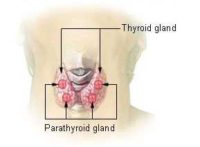14 May Thyroid Inflammation Linked to Depression and Anxiety
MedicalResearch.com Interview with:
 Teja Grömer PD Dr. med. Habil
Teja Grömer PD Dr. med. Habil
Facharzt für Psychiatrie und Psychotherapie
Lehrbefugter der Universität Erlangen-Nürnberg im Fach Psychiatrie
Bamberg
MedicalResearch.com: What is the background for this study?
1) I had seen hundreds of clinical cases with combined depression and anxiety and noted end of 2015 that most (far more than 50%) from the subjective clinical impression were associated with autoimmune thyroiditis (AIT)
2) Autoimmune thyroiditis on the mental side leads to specific symptoms, exhaustion, tachycardia, restlessness.
3) I thus decided to do a systematic review and meta-analysis.
MedicalResearch.com: What are the main findings?
Response: The work shows that there is a 3,5 fold risk for depression and 2,3 fold risk for anxiety in AIT. As AIT is very common (10% of the general population) at least 45% of depression and 30% of anxiety are associated with autoimmune thyroiditis.
MedicalResearch.com: What should readers take away from your report?
Response: This has numerous specific treatment consequences from the systematic review. Information of patients allows them to trace the origin of their symptoms. Often they feel relieved. An early treatment with weight-neutral antidepressants is effective. Selenium can be added to treatment with levothyroxine. A screening for autoimmune thyroiditis (determination of antibodies in blood samples) is recommended in patients with depression and anxiety. In patients with AIT a screening for mental disorders is recommended and they must be informed about the risk.
MedicalResearch.com: What recommendations do you have for future research as a result of this work?
Response: Autoimmune thyroiditis cases must be considered an independent group in research on depression and anxiety. More effort must be taken researching origins of AIT and its treatment.
Citations:
[wysija_form id=”3″]
The information on MedicalResearch.com is provided for educational purposes only, and is in no way intended to diagnose, cure, or treat any medical or other condition. Always seek the advice of your physician or other qualified health and ask your doctor any questions you may have regarding a medical condition. In addition to all other limitations and disclaimers in this agreement, service provider and its third party providers disclaim any liability or loss in connection with the content provided on this website.
Last Updated on May 14, 2018 by Marie Benz MD FAAD
